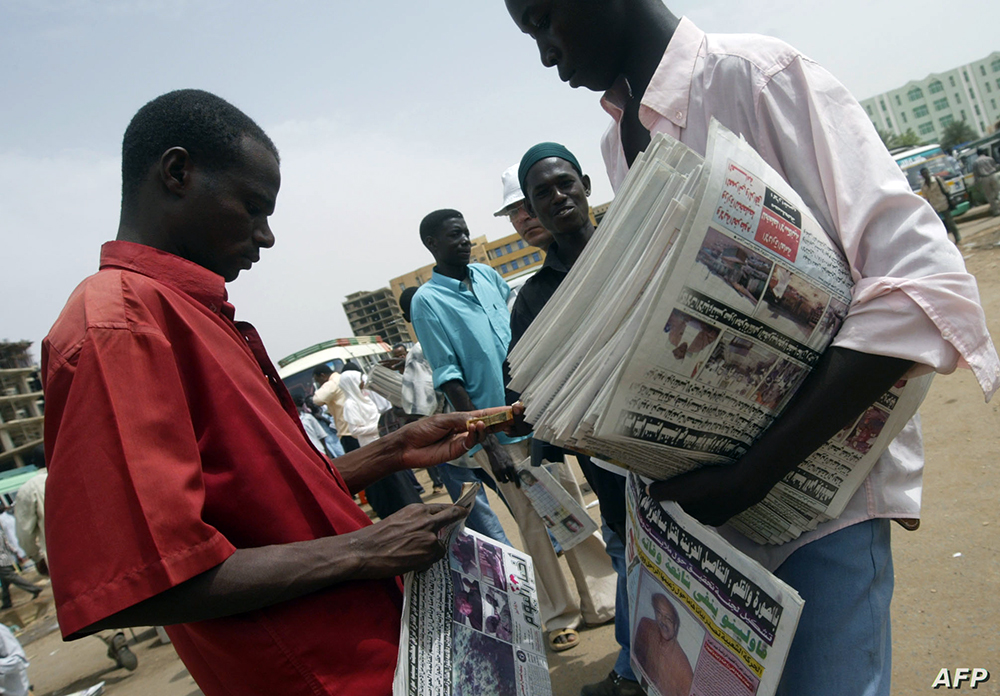
Sudans Newspapers Scattered Due to War
Al-Zain Osman
Since April 15th, the seventy-year-old man has not left his home for his workplace located under the tree known as the "newspaper tree" in Kosti City, southern Sudan. The man, along with thousands across Sudan, used to sell daily newspapers printed in the capital, Khartoum.
Due to the ongoing war since mid-April, thousands have lost their jobs, including those known as "newspaper vendors". They are a category that handles the distribution of daily newspapers and are considered a part of the community of journalists working for these papers. More than ten daily political and specialized newspapers used to be printed in Khartoum, and they have all ceased publication due to the war, causing most of the workers to lose their jobs due to the closure of printing presses.
The irony is that, amidst the war in Khartoum, local newspapers that used to be published in Port Sudan, where the governments work has been transferred, have also stopped. This is because three newspapers that were issued in the city were printed in Khartoum.
Earlier, most of the printed newspapers issued in Khartoum were printed in the International Press, an investment owned by the General Intelligence Agency, before the printing operations were moved to the Military Press in the Karrari military area, following the revolution that overthrew the previous regime. This area is now witnessing confrontations between the Sudanese army and the Rapid Support Forces.
In the context of the wars impact in Sudan, Sudanese people have been deprived of following news about their country through daily newspapers, which had a significant impact surpassing that of modern media institutions, particularly outside the capital. According to observers, the Sudanese press played a pivotal role in exposing Bashirs regime before it was overthrown by the people.
Apart from faint and pale appearances on social media or the official websites of some Sudanese newspaper names, the whole scene confirms a main hypothesis. The absence of daily newspapers in a country living death around the clock is primarily linked to the absence of printing presses, coupled with the absence of the staff who were carrying out the journalistic process. Although the decline of newspapers and printed media in Sudan had begun since the COVID-19 pandemic, the war completely put an end to it.
For half a year, Sudan has been without newspapers, a country where journalism existed before the establishment of the state with its borders and sovereignty. The history of Sudanese journalism spans over a century. The recent absence does not seem to be related only to the absence of active printing presses, but also to other factors related to the environment of Sudan amidst the war, and the environment of Khartoum, which was the primary producer of journalism. Most locations of the Sudanese newspapers are situated at the heart of the conflict zone near the General Command and the Republican Palace. Moreover, reports issued by the Sudanese Journalists Syndicate and the Sudanese Journalists Network indicate multiple cases of violations committed against them by both sides of the conflict, prompting many of them to leave the capital, which is no longer fit for living.
For half a year, the country has been without daily newspapers, and the main story is that the institutions where the journalists worked have not paid them salaries since the first gunshot. Most journalists have hastily left Khartoum and engaged in other activities in the areas they relocated to, so there are no newspapers.
Uncle Ahmed will not leave his home to go to the tree waiting for newspapers that are absent this time only due to the war, but also because someone else selling clothes and household items now sits in the same place where he used to sell newspapers. This other person used to be, until April 15th, a journalist before the war forced him to change his profession in order to make a living for himself and his family.

